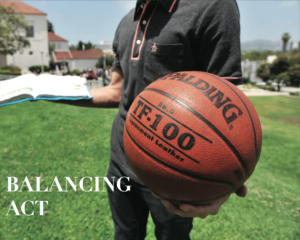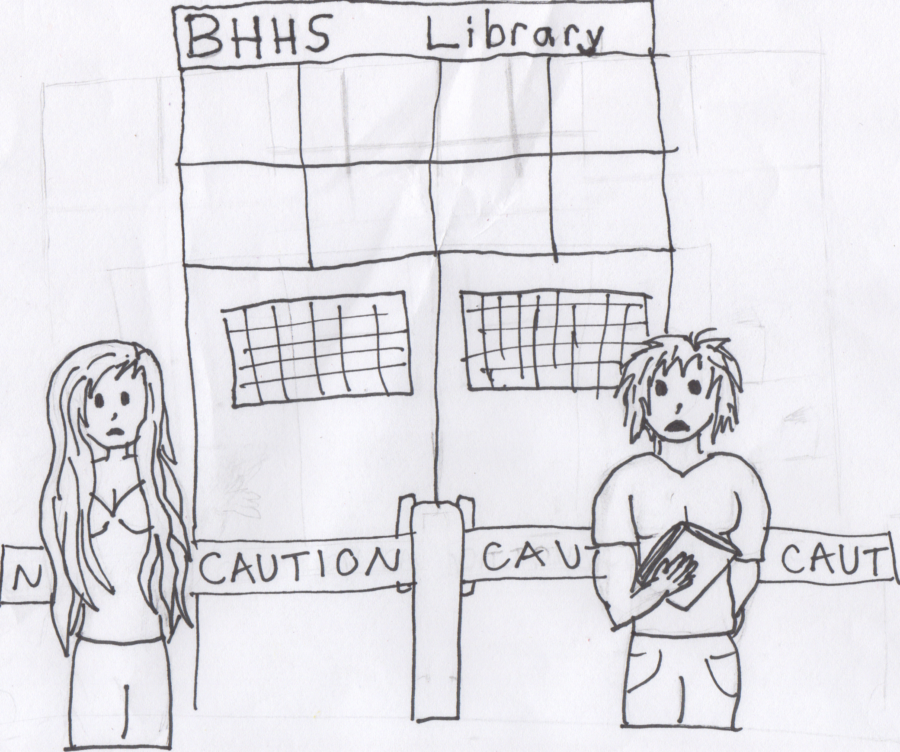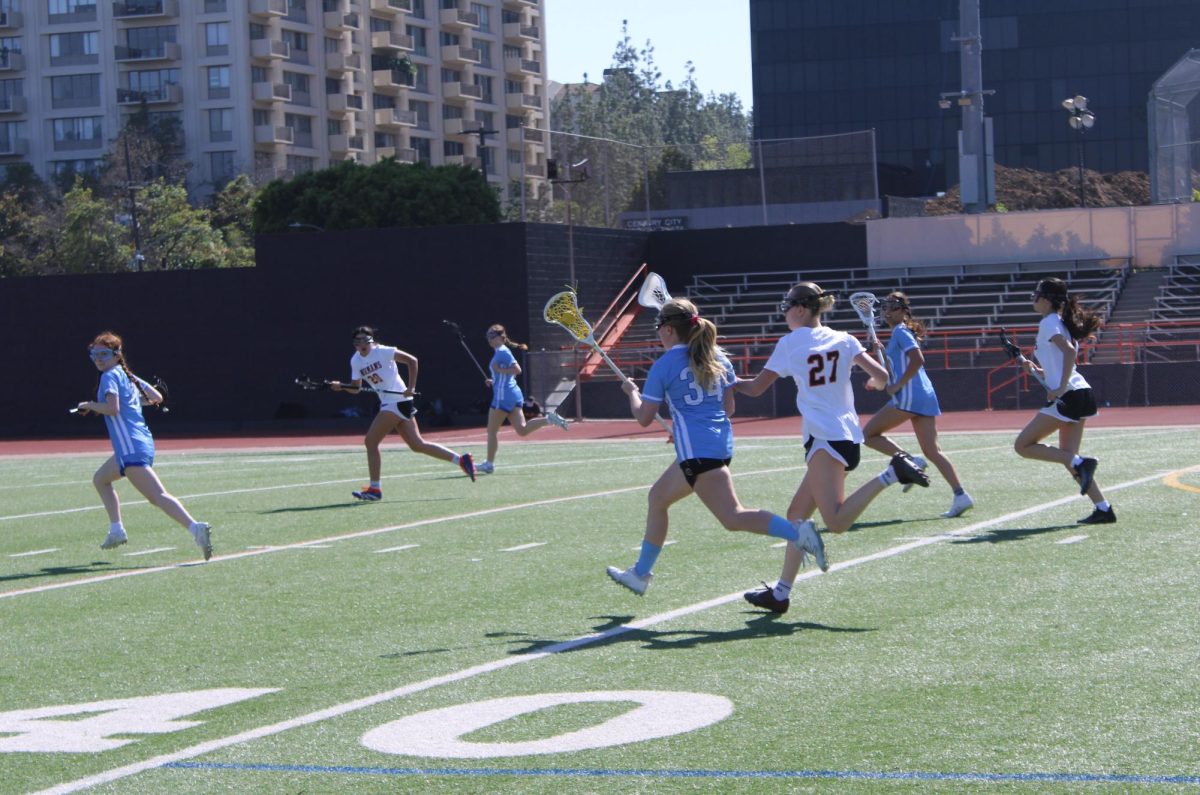Mabel Kabani, news editor

Junior Daeun Lee runs her last lap around the track, her black and pink spikes thumping against the hard hot ground. Though she has sprinted over seven miles in the course of the past few hours in preparation for her track meet, she feels energetic and content. However, the healthy and happy glow often accompanied with exercise leave Lee’s face when she logs onto Jupiter Grades and sees what homework she has in store for her that night.
“Track and cross-country take up a lot of time and it’s hard to balance academics along with a sport that requires so much dedication,” Lee said. “But I would never quit my sport, just because running is something I enjoy. And although balancing practice with homework is difficult, it’s worth the additional stress.”
Studies have shown that teens engaged in sports are more likely to lead healthier, happier, stress-free lives, according to Science Daily. In addition, a recent study in West Virginia shows that teens not engaged in sports or physical activities are 30 times more likely to describe the quality of their life as poor in comparison to those involved in a school sport or team.
Though participating in school sports can positively contribute to a teen’s mental and physical health, being on a sports team in high school can also de- grade the quality of students’ mental health. Students can become stressed upon struggling to manage academics and sports and live up to their parents and team’s expectations, decreasing their self-esteem in the process.

Junior Daeun Lee runs her last lap around the track, her black and pink spikes thumping against the hard hot ground. Though she has sprinted over seven miles in the course of the past few hours in preparation for her track meet, she feels energetic and content. However, the healthy and happy glow often accompanied with exercise leave Lee’s face when she logs onto Jupiter Grades and sees what homework she has in store for her that night.
“Track and cross-country take up a lot of time and it’s hard to balance academics along with a sport that requires so much dedication,” Lee said. “But I would never quit my sport, just because running is something I enjoy. And although balancing practice with homework is difficult, it’s worth the additional stress.”
Studies have shown that teens engaged in sports are more likely to lead healthier, happier, stress-free lives, according to Science Daily. In addition, a recent study in West Virginia shows that teens not engaged in sports or physical activities are 30 times more likely to describe the quality of their life as poor in comparison to those involved in a school sport or team.
Though participating in school sports can positively contribute to a teen’s mental and physical health, being on a sports team in high school can also de- grade the quality of students’ mental health. Students can become stressed upon struggling to manage academics and sports and live up to their parents and team’s expectations, decreasing their self-esteem in the process.
Though 55.5 percent of all American high school students play a school sport, according to U.S. News, being able to balance grades and sports frequently poses a challenge for students. The overwhelming amount of energy and time put into both studying for tests and practicing for competitions tires the students’ bodies and minds, causing both stress and anxiety.
“Of course, balancing sports and academics is a challenge,” junior Sam Levy said. “Sports like cross-country and soccer require a lot of dedication, and being able to manage homework and tests with races and five hour long practices is difficult; I’ve gotten used to it though. But if I wasn’t on any of those teams anymore, I would probably be getting more sleep and would be less stressed.”
Intervention counselor Ali Norman-Franks agrees that more often than not, “students who are often feeling stressed have too much on their plates, and sports play a huge role in that.”
Another reason high school sports can decrease the quality of mental health among students is that student athletes have a hard time separating self confidence from their levels of performance in sports during their games, according to sports coach and psychologist Brian Mac.
“Of course, balancing sports and academics is a challenge,” junior Sam Levy said. “Sports like cross-country and soccer require a lot of dedication, and being able to manage homework and tests with races and five hour long practices is difficult; I’ve gotten used to it though. But if I wasn’t on any of those teams anymore, I would probably be getting more sleep and would be less stressed.”
Intervention counselor Ali Norman-Franks agrees that more often than not, “students who are often feeling stressed have too much on their plates, and sports play a huge role in that.”
Another reason high school sports can decrease the quality of mental health among students is that student athletes have a hard time separating self confidence from their levels of performance in sports during their games, according to sports coach and psychologist Brian Mac.
“You do yourself harm by making comparisons to other athletes who you think are better or more talented than you are,” Mac wrote on his website. “This only serves to hurt your self-esteem and confidence because you put other players on a pedestal and criticize your own faults.”
This decline in a student’s self-esteem and confidence at such a crucial age of brain development can profoundly affect the way a teen will see himself or herself in the future.
“Sometimes when I don’t give my best during a match, I feel really angry and humiliated,” a sophomore who wished to remain anonymous said. “I wish I didn’t, but losing a game really makes me think less of myself.”
Though students can lose confidence from not playing at their optimal level, which can negatively affect their mental health, the overwhelming pressure to win that students receive from parents and coaches also poses a burden.
According to a study at Northern Illinois University (NIU), teens who are burdened with an expectation to win can suffer increased stress.
“The downside of the extensive participation in sports by American adolescents includes the increased high expectations by parents and coaches to win at all costs,” the official NIU college education website said. “Being in an environment that stresses winning at all costs can make [a student] totally stressed out.”
This decline in a student’s self-esteem and confidence at such a crucial age of brain development can profoundly affect the way a teen will see himself or herself in the future.
“Sometimes when I don’t give my best during a match, I feel really angry and humiliated,” a sophomore who wished to remain anonymous said. “I wish I didn’t, but losing a game really makes me think less of myself.”
Though students can lose confidence from not playing at their optimal level, which can negatively affect their mental health, the overwhelming pressure to win that students receive from parents and coaches also poses a burden.
According to a study at Northern Illinois University (NIU), teens who are burdened with an expectation to win can suffer increased stress.
“The downside of the extensive participation in sports by American adolescents includes the increased high expectations by parents and coaches to win at all costs,” the official NIU college education website said. “Being in an environment that stresses winning at all costs can make [a student] totally stressed out.”
The added pressure of having to win causes teens to become overworked and suffer changes in mood and attitude.
“I have to win every tennis game I play,” junior Ethan Kunin said. “My coach, my team and I have set expectations up for myself in which I have to win. If I don’t win a tennis match, I definitely will not be a pleasant person for a couple hours after the game.”
Students who put too much pressure on themselves to balance school and sports and who push themselves too much can negatively harm their minds to the point at which they reach a mental state of being “burned out.” Too much work, a large amount of pressure and not enough confidence can cause this state, which can later prompt chronic fatigue, depression, anxiety and rapid loss of previously learned skills, according to the NIU ath- letic site.
Dire consequences may result from students’ growing workloads and their large emphasis on succeeding at sports. However, students who are able to balance athletics and school work, distinguish their self-confidence from their performance level and play for the thrill of the sport, rather than for the win, can further enjoy athletics and increase their mental health.
“I have to win every tennis game I play,” junior Ethan Kunin said. “My coach, my team and I have set expectations up for myself in which I have to win. If I don’t win a tennis match, I definitely will not be a pleasant person for a couple hours after the game.”
Students who put too much pressure on themselves to balance school and sports and who push themselves too much can negatively harm their minds to the point at which they reach a mental state of being “burned out.” Too much work, a large amount of pressure and not enough confidence can cause this state, which can later prompt chronic fatigue, depression, anxiety and rapid loss of previously learned skills, according to the NIU ath- letic site.
Dire consequences may result from students’ growing workloads and their large emphasis on succeeding at sports. However, students who are able to balance athletics and school work, distinguish their self-confidence from their performance level and play for the thrill of the sport, rather than for the win, can further enjoy athletics and increase their mental health.






























